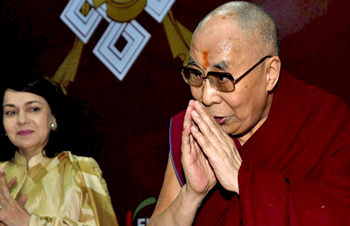Beijing, Apr 6: China warned on Wednesday that it will take “necessary measures” to defend its territorial sovereignty and interests after India “obstinately” allowed the Dalai Lama to visit the “disputed” parts of Arunachal Pradesh causing “serious damage” to bilateral ties.
 China also lodged a protest with India's Ambassador in Beijing Vijay Gokhale over the Dalai Lama's visit.
China also lodged a protest with India's Ambassador in Beijing Vijay Gokhale over the Dalai Lama's visit.
“India in disregard to China's concerns obstinately arranged the Dalai Lama's visit to the disputed part of the eastern part of China-India border, causing serious damage to China's interests and China-India relations,” Chinese Foreign Ministry spokesperson Hua Chunying told reporters.
China firmly opposes this move, she asserted.“China's stand on the eastern part of the borders is consistent and clear. India is keenly aware of the role played by the 14th Dalai Lama,” she said.
“Arranging his visit to those sensitive and disputed areas not only runs counter to the Indian side's commitment to the issues related to Tibet but also escalates disputes over the border area,” she added.
Hua stated that it goes against the momentum of the sound growth of bilateral relations and will not benefit India in any way.
“The visit will for sure trigger China's dissatisfaction. This will not bring any benefit to India,” she said.
China will firmly take necessary measures to defend its territorial sovereignty and legitimate rights and interests, Hua asserted.
Asked what measures China would take, Hua did not elaborate. “I don't have much to add. I want to add the issues concerning Tibet have a bearing on China's core interests. India in disregard of China's concerns obstinately arranged the visit,” she said.
“We demand the Indian side immediately stop its actions using the Dalai Lama to undermine China's interests and not hype up sensitive issues between the two countries, not artificially damage the foundation of the talks between the two countries on the border issues and bilateral legislations and take concrete actions to safeguard the China-India relations,” she said.
The 81-year-old Tibetan spiritual leader reached Bomdila in West Kameng district on Tuesday, starting his nine-day visit to Arunachal Pradesh.
“We hope we can work together to maintain growth of India-China relations. We know India and China are two close neighbours and countries in Asia. Cooperation between us will serve interests of the region,” Hua said.
“We hope to maintain good momentum of growth but this move runs counter to this wish. So we hope India stops doing things that undermine our interests,” she said.





Comments
Add new comment